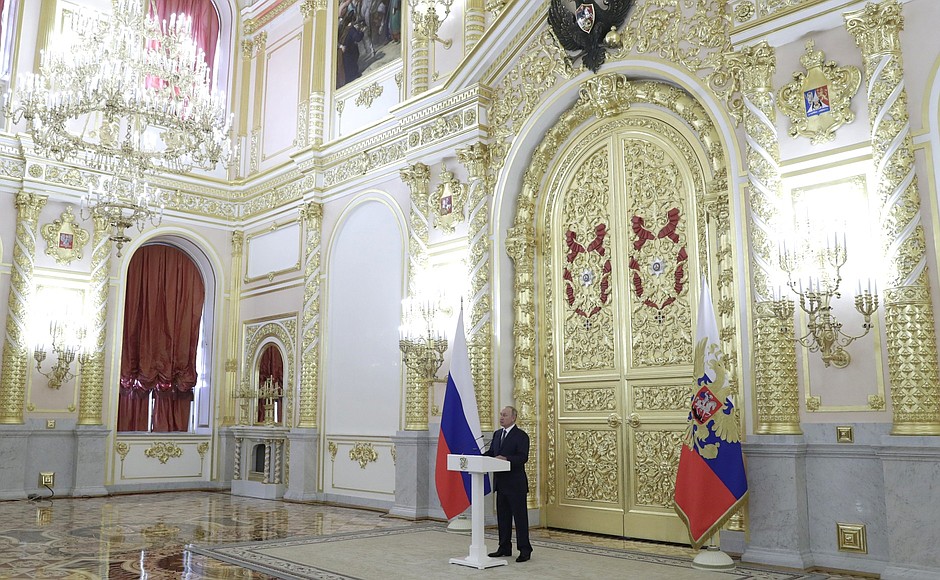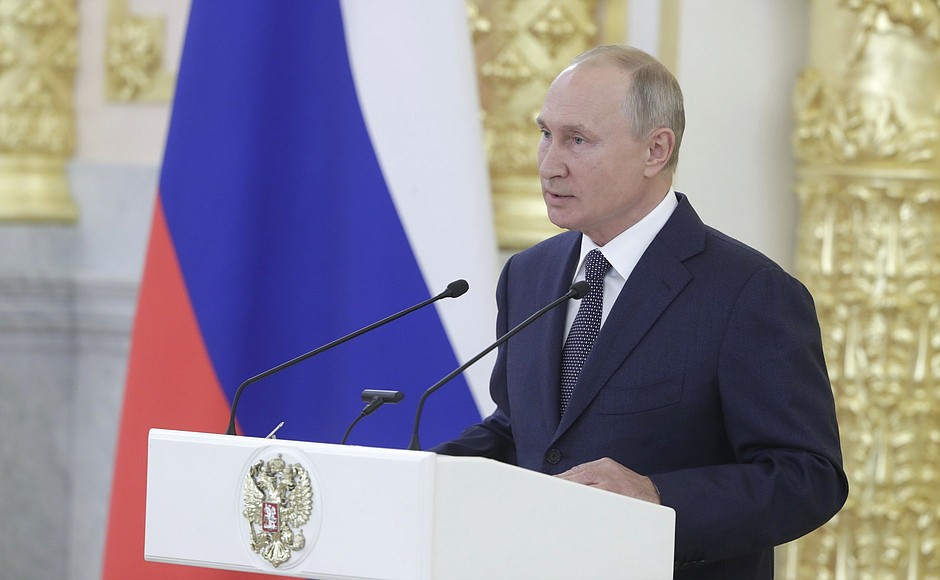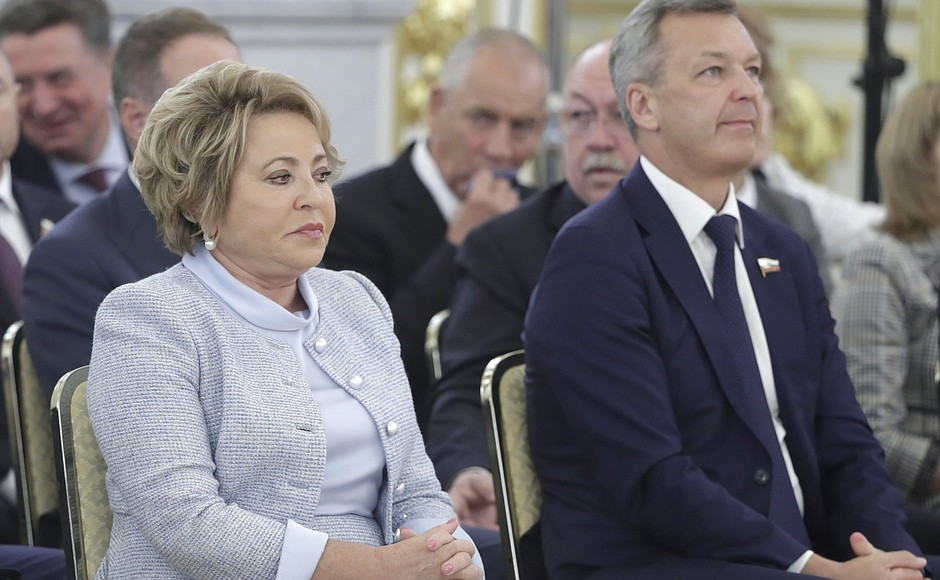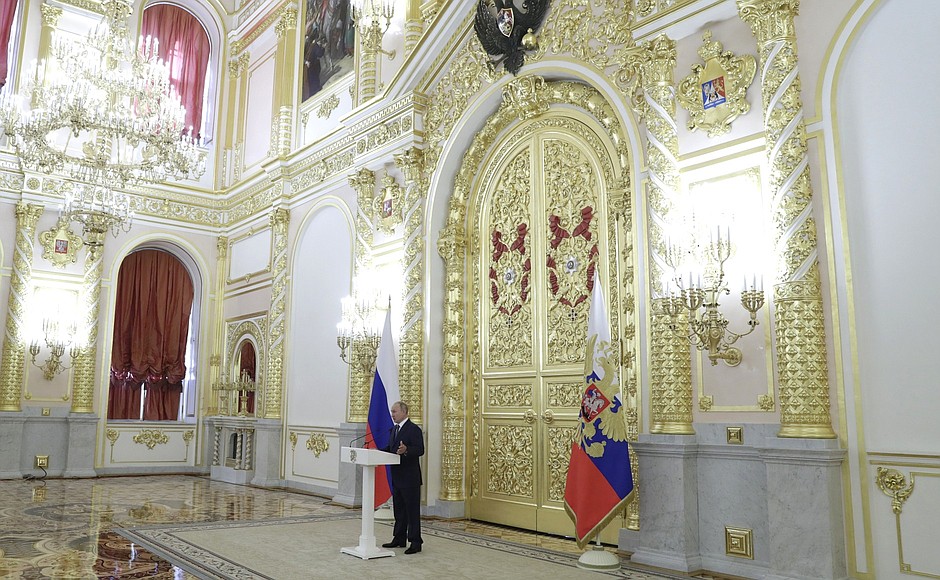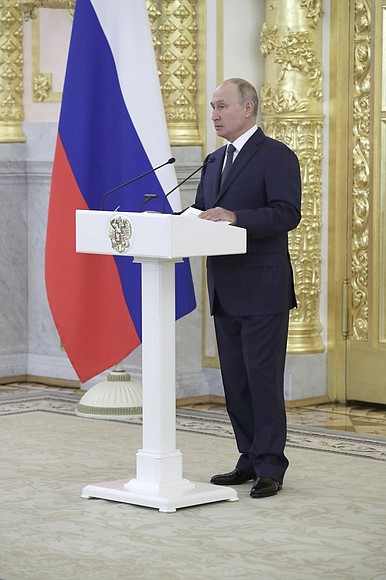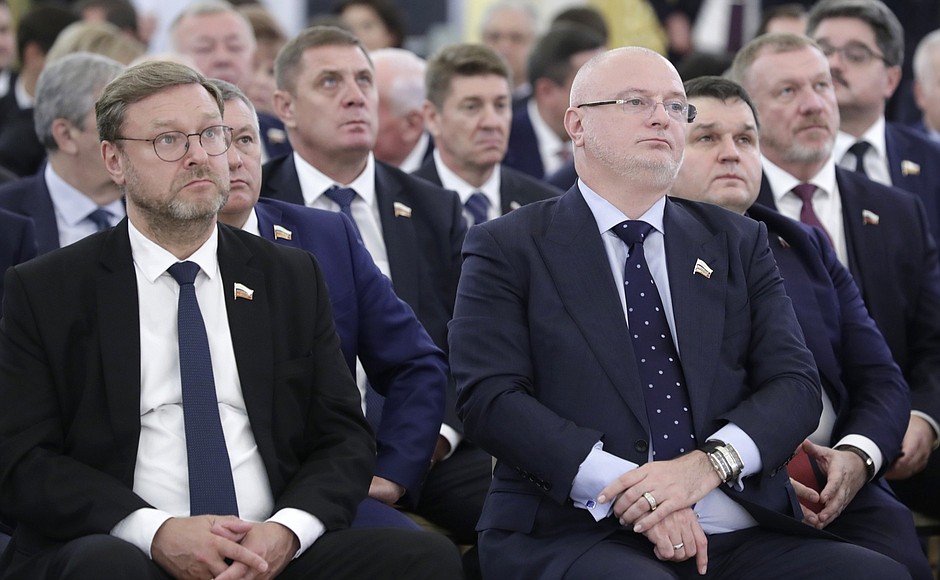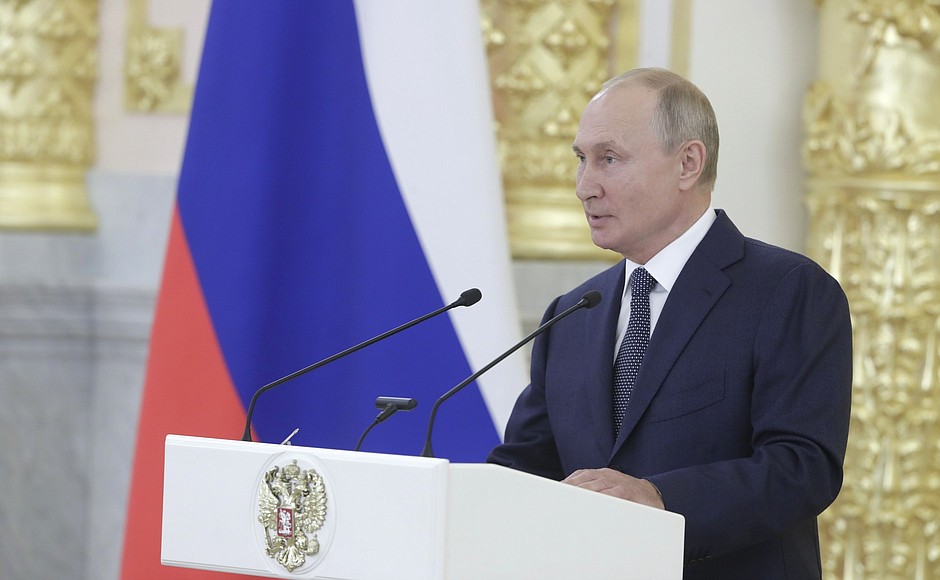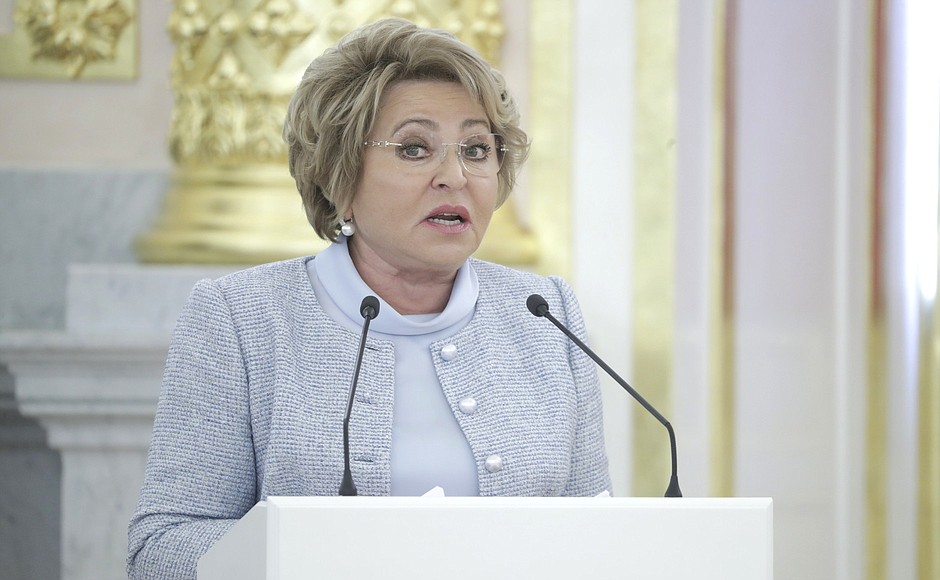President of Russia Vladimir Putin: Good afternoon, colleagues,
Ms Matviyenko, members of the Federation Council,
The upper house of parliament has just held its first meeting as part of the autumn session. I am aware that your agenda includes extremely important, fundamental questions for the country and its people. As Ms Matviyenko and I had agreed, we are meeting here today, as planned. I would like to outline the way I see the tasks and priorities we will be working on together.
I would like to begin this meeting by thanking the parliament’s upper house for its responsible and coordinated work during the epidemic, an extremely challenging period, and for promptly passing laws to support families with children, Russian businesses and the real economy.
And, of course, I would like to specifically note the contribution made by the Federation Council representatives to drafting the amendments to the Russian Constitution. During these efforts, you relied on your law-making experience, as well as the ability to heed the needs of the society, to listen to the people, account for their proposals and fulfil their aspirations. I know that you worked on the ground in your regions.
I would like to repeat – the idea, the essential meaning of constitutional innovations is to set the fundamental framework for the country's sustainable development for decades to come. This means historical continuity, moral values, reliable social guarantees, and a greater role of civil society. Finally, it means a better and improved balance, balance between all branches of government, while maintaining Russia as a strong presidential republic.
To this end, the powers of both houses of parliament have been significantly expanded. The role of the State Duma in forming the Government is bigger, as is the Federation Council’s role in appointing the heads of law enforcement agencies, the Prosecutor General and his deputies, and regional prosecutors. In any case, colleagues, we are taking steps in the right direction.
The Constitutional amendments are intended to ensure unconditional observance of law and order, the protection of people’s interests as well as freedom of enterprise and other freedoms.
I would like to emphasise that our society has strongly supported the course towards strengthening Russia's sovereignty. And this implies both the priority of our legislation, and a complete ban on holding public office for persons with foreign citizenship, nationality or residence permits in a foreign state, as well as persons who have accounts or deposits in foreign financial institutions, banks.
A person who chooses a civil service career must be independent of any external influence, without the slightest chance of anyone ever putting them on the hook, putting them under any sort of dependence.
The first package of draft laws to implement the new provisions of the Constitution has been prepared. It was sent to the State Duma for consideration yesterday. You know, there is an entire package, a large number of draft laws.
But I would like to emphasise – we are embarking on qualitative development of the entire legal framework and, above all, laws that directly determine the present and the future of Russia as a legal social state, regulate such important areas as healthcare, education, employment and wages, and social guarantees.
I am addressing the Government and our parliament now: our citizens have become the true co-authors of the Fundamental Law, the revised Fundamental Law, and they should experience the effect of the adopted amendments in their daily lives to the full.
Clearly, I have mentioned many times that the Constitution is the Fundamental Law which creates basic living conditions in the country. Nevertheless, the things that we discussed and then included in the Fundamental Law should be reflected in the current legislation and, of course, in people’s everyday lives. People's needs should be reflected in the most important financial document – the federal budget which is also an important law for 2021 and for the 2022–2023 planning period. We will discuss this in more detail today.
The most important priority of Russia’s state policy was added to the Constitution by the people’s decision. I am referring to children – the part about creating the best opportunities for their comprehensive development.
In this year's Address, I proposed a package of measures to improve demographics and support Russian families. All the necessary resources for this are now included in the draft budget for the next three years.
For reference – government spending on implementing the 2020 Address will increase from 0.7 trillion rubles to 1.2 trillion rubles in 2023, up 80 percent.
This year, the total amount of maternity capital has been increased to 616,617 rubles. A family now becomes entitled to 466,617 rubles when their first child is born, as you know. And what is also important is that maternity capital will be indexed annually.
As of January 1, 2021, this benefit will increase by almost 23,000 rubles to 639,432 rubles. The amount received at the birth of the first child will be almost 484,000 (483,882 rubles, exactly), that is, it will grow by more than 17,000 rubles.
Next, we provide monthly child allowances to low-income families and families in a difficult financial situation. In total, these support measures cover 4.85 million children aged 7 and younger.
The allowance for a child up to 3 years old amounts to one subsistence minimum for children in a particular region. Since January 1, and this was one of the important decisions outlined in the Address, we have also provided payments for children aged 3 to 7 which amount to half of the regional subsistence minimum for children in a particular region. The national average (perhaps, not a very pleasant concept of “average,” we talk about it all the time, but, unfortunately, we cannot come up with anything different), it amounts to 5,500 rubles.
Let me remind you that this allowance is being paid for the period that began in January. But the families were supposed to receive the money in July, after all the organisational issues had been taken care of. However, given the difficult situation caused by the pandemic, all the formalities were quickly taken care of, and families received a one-time payment for the first six months of the year. A month ahead of the deadline, as early as June.
In January I said this in my Address and then repeated it many times, you are probably aware of it, we will see how this measure works and whether it is enough for a particular family, and take the next step. This is exactly what we will do.
So, when working on the budget, please provide for the possibility of an increase in the level of such payments starting from 2021. The Government should identify clear, understandable and fair criteria for providing additional support for the families whose monthly income is lower than the regional subsistence minimum per person. There are such families, despite an increase in this payment. Additional decisions must be made with regard to these families. To reiterate, this should be a simple, convenient and straightforward mechanism.
I also want the Government, together with the Federation Council, to analyse the current situation with creating new places at preschools for children under 3. Understandably, due to the epidemic and for objective reasons, the regions were unable to fully implement their plans. Nevertheless, the gap needs to be bridged by the end of the year. Next year, the families in question must be provided with places at nursery.
I want to note, and I think my colleagues in the regions will hear me, the gap is wide. I will not give specific numbers as I believe it was due to objective circumstances. But we need to adjust the schedules.
I would also like to note that our plans and support measures were created in a fundamentally different situation. But this does not mean that we can afford to forget our obligations. On the contrary, they must be implemented as quickly as possible in order to support our families.
So, starting September 1, we began to systematically work to provide hot meals to all primary school students from grades 1 to 4. As a result, over 7 million children will receive free hot meals.
I want the Federation Council, the Ministry of Education and the Russian Popular Front to keep monitoring this situation with special focus on small schools, because it is more difficult to do this there, as you know. If you are unable to supply the appropriate equipment, you need to arrange meals in nearby cafeterias or start delivering ready meals to schools.
Over 40 billion rubles will be allocated for organising meals for primary schools in 2021.
To reiterate, all problems and sensitive issues must be taken into account in the budget, including the creation of modern and decent conditions for education, including at schools located in rural and hard-to-reach areas.
In 2021, 76.1 billion rubles will be allocated for creating new school places.
And, of course, we will support teachers who are in charge of classes because they bear special responsibility not only for education but also for the upbringing of children.
As you are aware, as of September, class teachers will receive monthly federal payments of 5,000 rubles. Over a period of the next three years, the federal budget must allocate 75 billion rubles a year for this purpose.
I ask the Federation Council and the Ministry of Education, together with authorised bodies of budget and tax control, to make sure that these payments are made to teachers in time. There should be no failures in this respect and this is not even a subject for discussion. Everything must be done on time.
I would also like to remind you that all previous additional payments, including regional ones, must be kept in place and also paid in full. Otherwise everything will become pointless. I am referring to our federal payments. The teachers must be able to see them on their payslips. The federal extra payments for classroom management must be separately recorded rather than be incorporated in something else.
Furthermore, accessibility of higher education is an important issue for families with children. This year we have funded additionally – and I want to stress this so that there are no tattles here – 11,500 state-funded places at universities. They mostly went to universities and institutes in our regions where doctors, teachers and digital economy experts are in demand. On the whole, 60 percent of school leavers have received an opportunity to study at a university at the expense of the state.
I mentioned that these openings will be primarily granted to school leavers, young people in the regions. In other words, 9,500 out of the 11,500 state-funded places have been created for regional universities.
Next year, the number of state-funded places will be increased by another 33,000. The federal budget must provide the relevant funds for this purpose.
On the whole, I would like to repeat that all the programmes dealing with supporting Russian families and all our social commitments to our people will be funded in full. We have the resources for this.
Let me recall that during the pandemic, with its very complicated consequences in the world and in this country as well, and also despite a sharp drop in the prices of oil and other energy supplies that are the main source of our budget revenues, we have managed to substantially increase our federal expenses and support our people and the economy. We have done this owing to our low national debt and the financial reserves that were accumulated earlier.
Incidentally, our revenues have decreased, understandably, by 11-odd percent, while our expenses have gone up by 23-odd percent. I have just said how we have managed to do this: owing to our accumulated reserves and a small national debt, one of the lowest in the world. But I would like to draw your attention to the following.
Colleagues, and I hope the deputies of the State Duma will hear me. We must not brush aside the Finance Ministry’s calls to abide by the macroeconomic parameters. This is a real achievement of our economy in the past few years. And, incidentally, owing to it, we are able today to carry out development programmes and support the economy and our people in this difficult time.
One more circumstance is also important. Our economy and our budget do not depend critically on the ups and downs of oil prices anymore. I said that hydrocarbons are the main source of our budget revenues, but, of course, we no longer critically depend on any fluctuations on the global markets.
I will quote specific figures. In 2011, hydrocarbon-related revenues amounted to half of all budget income, whereas in 2021, their share will drop to one-third. Hence, the share of the non-oil and gas budget revenues will increase almost to 70 percent. This is the first time in the history of modern Russia that we have achieved such budget system stability.
We have resolved far from all the problems and certain imbalances still exist. However, the trend is obvious: the structure of the Russian economy is changing, maybe slower than we would like, but in the right direction. The role of the non-resource industries is increasing and new, high-tech sectors are gaining strength. We must certainly build up this momentum, create modern jobs and increase Russian families’ incomes on this basis.
Senators, I once again note that reducing the poverty rate is a key task for us. Unfortunately this problem has been one of the most sensitive for our society; it affects millions across Russia. Of course, recently it has become more acute due to the pandemic and its impact on the economy.
As I have said, we will use the budget capacities to provide direct financial aid and establish an effective system to support families at all stages of raising children.
At the same time, we have to help people with generally low income levels overcome difficult life conditions and change their lives and the lives of their families. In fact, this is the main way to solve the problem, not just budget allocations. Let me repeat that this means high-quality, accessible education, modern jobs in big cities, towns and villages. And of course, this means targeted social support for low-income families. We are doing this and will continue to do it.
A social contract must become a key tool in combating poverty. Its implementation will begin across Russia next year. In the next three years we plan to allocate over 26 billion rubles annually from the federal budget to the regions to implement this programme. It is a matter of principle that this money is to help people improve their skills, find new jobs or start their own small businesses.
I expect to have an in-depth discussion on the mechanisms and the experience of implementing social contracts in pilot regions at the next Government meeting.
Now to the general situation on the labour market, which is an essential area, perhaps even the most essential area today both in Russia and all over the world. Perhaps it is even more serious in the leading economies in the world, more than in Russia. Unfortunately, the level of unemployment grew 1.7 percent in Russia (I will elaborate on this), but in some other countries the numbers are critical. The situation remains tense in Russia, too. Despite unprecedented support measures, the level of unemployment continued to grow in August and today exceeds 6 percent of the economically active population. This number means hundreds of thousands of people who have not found job so far.
Let me stress that I have already instructed the Government to deal with restoration of employment next year. We need to help people return back to normal jobs so that they can get a stable income and provide for their families.
Therefore, using the capacity of the budget and economic policy in general, we will continue to support enterprises in key industries, small and medium-sized businesses. The criterion here will remain the same, keeping and creating new jobs.
I would like to remind you that during the epidemic, we adopted several important and necessary decisions, targeted, but necessary, including providing enterprises in the most affected economic sectors with easy loans at a rate of 2 percent per year. We agreed that the debt would be completely written off if a company retains all its staff. Funds for writing off these loans totalling almost half a trillion rubles have been reserved in the draft federal budget for next year. I would like to ask the parliament to definitely support this decision.
And one more measure to stimulate the economy and entrepreneurship, which we introduced back in spring, and not for a short but for a long term. I am referring to a two-time reduction in insurance premiums for small and medium-sized businesses from 30 to 15 percent. This reduced rate will apply to wages that exceed the minimum wage. If wages do not exceed the minimum wage, then the rate will remain the same – 30 percent. I think that everything is clear here, we are simply trying to stimulate business to raise wages: if you raise wages then the rate will be reduced; if wages do not exceed the minimum wage you will pay the same rate of 30 percent. But let me remind you that, in accordance with the new amendments to the Constitution, paying below the minimum wage is a violation of the law, moreover, violation of the country’s Basic Law, the Constitution, it is simply unacceptable.
A two-time decrease in insurance premiums is almost half a trillion rubles, by the way. So, if we add together the funds for writing off easy loans to support employment, next year alone businesses will have almost one trillion rubles of additional funds, which the state leaves to the national economy. These funds can and should be prioritised for development and investment, and, of course, for raising workers’ wages. Here I am counting on a responsible approach, on the ability to think for the future, and domestic businesses can do this, and I really hope that this will be done by our entire business community.
That said, and I would like to emphasise this in particular, that despite a substantial shortfall in the revenues of the social and medical insurance funds, and the Pension Fund, we will certainly honour all our commitments to support our people and render medical assistance. We will finance them in full from the federal budget.
This also applies to the faster growth of pensions. Next year, pensions in Russia will be adjusted by 6.3 percent. This is more than 1.5 times the inflation rate predicted for 2021. In other words, we will act in this area as we said in the past, as we set our goals and promised our people.
Importantly, despite the difficulties with budget revenues, we managed to find flexible solutions and preserve the stimulating role of the fiscal system for the qualitative, structural upgrading of the economy. On the whole, we managed to lower the tax burden for the non-oil and gas industry. I have already mentioned this, we will do this not only by halving the insurance premiums for small and medium-sized businesses, as I said, to 15 percent but also by decreasing taxes for the IT industry. Insurance payments for them were reduced from 14 percent to 7.6 percent, and the tax on profits was drastically cut from 20 to 3 percent altogether.
Conversely, the tax burden on super incomes, primarily in the raw materials sector, has increased. As a matter of fact, we are doing this gradually, and this also leads to structural changes in the economy. I believe this is a justified and overdue step towards increasing the effectiveness and fairness of our fiscal system.
Colleagues, one more decision was made in the area of tax policy. I consider it fair and morally justified. You are well aware of it. We talked about this for a long time and kept the income tax at 13 percent. This is all understandable, and we did the right thing, I must say, because when we introduced the flat tax, tax collection increased sharply. So we did everything right. It is also true that the situation has changed now. Starting on January 1, those whose incomes exceed five million rubles per year will pay a higher tax of 15 percent. This will provide the budget with about 60 billion additional rubles. According to tentative estimates, maybe 62 billion.
What I would like to stress and bring to your attention: as I have said, all these funds, and people need to know this, I mean people in general as well as those who are to pay the additional 2 percent, that all these funds will be applied for treatment and rehabilitation of children with serious, even rare, so-called orphan diseases, to purchase expensive medicines and medical devices, to perform high-tech operations, including abroad, if necessary. And I’ll say this again: all the current effective federal and regional children’s treatment programmes and the expenses for medicines must be maintained; I am stressing this for our colleagues in the Russian regions.
By the way, the Government, along with the Civic Chamber, should prepare proposals on the development of a mechanism for the targeted financing of expenses I just mentioned by November 1. We will certainly discuss the distribution mechanism and control over the funding for the treatment of children with serious diseases with the Government.
As we have agreed, our citizens should be involved in this process, I have mentioned the Civic Chamber already, they should be people who have earned the respect and trust of society. There are many decent, honest and sympathetic people among those who give to charities, employees of non-profit organisations, and of course our doctors.
During the epidemic we have felt and understood even more the value of each human life, the importance of the heroic work of medical personnel, and of course, the great role of an effective healthcare system for society and the country.
Healthcare system capacity has grown substantially in recent months. Today, the healthcare system is able to efficiently fight the coronavirus infection and the seasonal upsurge in flu-related diseases. We are taking into account all possible risks and will, as before, be proactive.
New medical centres, specifically, advanced infectious disease hospitals have already been built and are now open; a reserve of medicines and protective equipment has been created. Our scientists were the first in the world to create a vaccine against the coronavirus. You have probably seen my address at the UN General Assembly. UN officials have asked us for cooperation, including with the vaccination. Of course, we will do this, especially in our region.
By the way, a second coronavirus vaccine will be approved soon. Our researchers have learned effective ways to prevent and treat it.
As I have said, our experience in combatting the coronavirus must and will be used in the regional programmes to upgrade the healthcare system. The Government, the Healthcare Ministry, the Russian regions and experts must closely cooperate here. This is why we decided to postpone the launch of these programmes for six months, to January 1, 2021. It is clear that we have to proceed carefully due to fiscal problems and the fact that the economy and our revenue have decreased, but we will not cancel these programmes. We have postponed them a bit, just six months, but they will be launched on January 1, 2021. At the same time, the total amount of the allocations has not changed: almost half a trillion rubles from the federal and 50 billion from the regional budgets.
Next year alone we expect to allocate 90 billion rubles from the federal budget to implement these programmes. This money must be invested in repairing existing facilities and in building new hospitals, polyclinics and paramedic centres where necessary, so they comply with the medical standards. And, of course, we need to ensure the retraining of medical workers to allow them to use cutting-edge methods for diagnostics and treatment, digital technologies and telemedicine.
One more area that directly affects the health of our people is ecological well-being. In 2021, expenses on the national environmental project will increase almost by half. On the whole, during the next three years, the federal budget will channel one trillion rubles into environmental protection for the first time.
These funds will be spent on infrastructure development, solid municipal waste disposal, air pollution reduction, river reclamation, and forest protection and restoration.
We will continue funding the work on eliminating dumps on the territory of cities and facilities, and cleaning up the accumulated environmental damage. As we agreed, the budget must fund the elimination of dangerous old chemical production facilities in the city of Usolye-Sibirskoye in the Irkutsk Region. The situation there is difficult.
Colleagues, ecological well-being means human health and longevity. This is a requirement for modern, comfortable life just as opportunities for movement and communication, as affordable housing, and last but not least, as the modern, well-maintained image of our large and small cities, their comfort and inimitable distinctness. We must ensure a well-balanced, harmonious, spatial development of Russia, and, hence, equal opportunities for our people regardless of where they live and work.
In this context, I would like to ask the Government and parliament to pay special attention to the programme on developing rural areas and find reserves to support it. One of the drivers of our national economic upsurge, the people who live and work here must lead a decent life. There are certain problems. You will see them during the discussion of the budget. I said that it is necessary to seek additional reserves. The Government was very responsible in drafting the budget, but there is still room for improvement.
In general, the draft budget will primarily fund the programmes that directly determine the quality of life, including social guarantees, demographic measures and assistance to families with children, as well as projects on the country’s infrastructure, spatial development, and on building up its educational, scientific and technological potential.
For example, 17 world-class scientific centres will be opened next year. They unite universities and research centres in the northwest, Central Russia, the Urals, Siberia and the Far East and will carry out research in scientific and technical development, including mathematics, genetics, medicine, microelectronics and new materials, digital technology, artificial intelligence, new energies, the environment, space exploration and exploration of the global oceans, the Arctic and the Antarctic.
Development of the transport infrastructure will continue. During the next three years, we expect to finish renovating airports in several regional centres including Voronezh, Lipetsk, Stavropol, Orenburg, Novosibirsk and Tomsk as well as Blagoveshchensk, Petropavlovsk-Kamchatsky and other populated areas in the Far East, including those in remote areas. Of course, this must go together with the development of regional aviation and the related segments of aircraft manufacturing.
We estimate that over 2.5 trillion rubles from the federal budget will be allocated to develop the highway system during the next three years, or about 6 trillion rubles considering regional road funds. This money will be spent on upgrading federal and regional roads as well as bypasses around cities like Togliatti and Krasnodar.
We all understand that road construction has a powerful and compounding effect that boosts related industries, creates new jobs, new productions, and of course, a wide, high-quality road system is a key factor in the development of a territory and the creation of favourable living conditions.
In this connection, I am asking the Government to work on allocating additional resources to further develop road construction in 2021–2023 as well as on the wider use of extra-budgetary money, mainly allocating money that is attracted via infrastructure bonds (an effective and tested tool that works) for large projects on agglomeration infrastructure development as well as using tools like public-private partnerships more widely.
One example of such projects is the Moscow-Kazan highway, which is scheduled to be completed by 2024. It will stretch for almost 800 kilometres and pass through six regions, where about 30 million of our citizens live. There are plans to invest over 650 billion rubles in this project.
This project will give an impetus to business activity, strengthen economic ties, increase the investment attractiveness of Central Russia and the Volga Region, and help to fully reveal their unique tourism potential, including that of the beautiful, wonderful ancient cities of our country, cultural and spiritual treasures of Russia, such as Murom, Diveyevo and many of our other historical centres.
Let me remind you that since 2018, we have supported 80 improvement projects for small towns and historical settlements every year. We have divided them according to fine criteria, let it be so. It’s another thing that matters. What matters is that starting this year their number will double. That is, at least 160 winning projects of the Russian competition for creating a comfortable environment in small towns and historical settlements will now receive support from the federal budget.
History, traditions, culture and spiritual values are what determine the future of our people. This is the foundation of our existence. But this is also the future of our country. It is a legacy that we must preserve for future generations.
Also, in the next three years, federal budget funds will go towards building a new museum complex of the State Tretyakov Gallery and renovating the Tchaikovsky State Conservatory.
By the way, I do not want to interrupt the flow of my message, my speech, but I cannot help but mention, and I am drawing the attention of representatives of St Petersburg to this, the reconstruction and repair of the St Petersburg Conservatory. The renovation is a great and timely idea. Soon it will just turn into a problem. I have already drawn the attention of current leadership to this. In fact, they are not directly responsible for this unfinished construction, they have only recently taken up their posts. I would ask you, colleagues, and I remind the Government once again: we need to address this issue and bring it to an end, to its logical conclusion.
Additional funds are certainly needed for the Moscow Conservatory, and will be allocated for the development of the Yasnaya Polyana museum estate and for the creation of a national historical and archaeological centre in Veliky Novgorod. I want to point out the restoration of the Vorontsov and Khan palaces in Crimea and other unique historical sites on the Crimean peninsula. I ask you to support these decisions, of course.
Colleagues,
As soon as next year, we must more actively move from overcoming the consequences of the epidemic and economic recovery back to development projects with a forward-looking perspective and focus on achieving national development goals, while maintaining a responsible budget policy and the stability of state finance.
Of course, our main goal is to provide for the well-being of Russian citizens, Russian families, increasing household incomes, improving the health of our people, offering extensive educational opportunities for the young so that everyone can prove their worth and work for the benefit of their families, enterprises, companies, cities, regions and therefore of the entire country, of all of Russia.
I strongly believe that these will be the very priorities that will guide us when drafting and approving the federal budget, as well as when taking all government decisions both on current affairs and strategic matters.
Once again, I would like to thank you for your extensive efforts and fruitful work.
Thank you very much for your attention. I wish you every success.
<…>
Vladimir Putin: Ms Matviyenko mentioned the election campaign.
In this connection, I would like to thank our people for their proactive contribution to our joint efforts to form local and regional governments, and for their support.
I hope that all our newly elected colleagues will do everything they can and will go to great lengths to meet the expectations of their voters and the trust placed in them.
And one small practical observation that directly concerns you and the people who delegated you to the upper house of the Russian parliament. This has to do with the regional budgets. The measures taken by the Government of the Russian Federation regarding budget consolidation in order to deliver on the national agenda cannot fail to affect regional finances. In some cases regions will have to cut some spending items. I raised this issue with the Finance Minister this morning. The Government understands this and will provide punctual, targeted support to the regions that really need it. I want you to know this so that you can work constructively with the Government and complete this work as part of the budget process.
Thank you very much. All the best.
